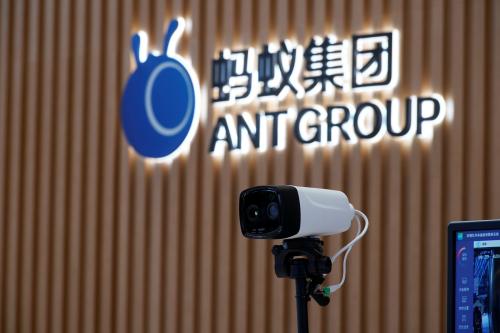At a time when the United States and its Western allies are struggling to determine the proper oversight of digital platform companies, the Chinese government is moving decisively ahead with its own plan. That China has designed regulations for these digital platform companies to stimulate competition and innovation should send a message to Western policymakers.
The new policies—ranging from competition enforcement to opening corporate data hoards—are an exercise of raw autocratic power. Apparently, one reason for the action is preservation of that power against the growing strength of the platform companies and their charismatic leaders. Another rationale for the move, however, is that the new enforcement will make Chinese digital platform companies more competitive and stimulate innovation.
Deflating Anti-Regulation Rhetoric
American digital platform companies, such as Facebook and Google, have long argued that regulation would not only put the U.S. at a competitive marketplace disadvantage to China, but a national security disadvantage as well. Sheryl Sandberg, Facebook’s chief operating officer, played the “competition with China” card when she told CNBC, “[w]hile people are concerned with the size and power of tech companies, there’s also concern in the United States with the size and power of Chinese companies, and the realization that these companies are not going to be broken up.”
Given this supposed “realization,” it is significant that the Chinese government itself has punctured that myth by reining in digital platform giants. “There have been over 50 regulatory actions against scores of [Chinese] firms for a dizzying array of alleged offenses, from antitrust abuses to data violations,” The Economist reported.
Google CEO Sundar Pichai has promoted the supposed national security argument against regulation. He told CNN, “I worry that if you regulate for the sake of regulating, it has lots of unintended consequences…[including] implications for our national security.” Of course, no one advocating for oversight of digital platform companies has suggested regulation simply “for the sake of regulation,” but for the protection of consumers and marketplace competition. And the fact-of-the-matter is that a competitive marketplace drives innovation (and national security) better than a monopoly.
“Big Tech” Moniker is Misleading
The moniker “Big Tech,” which is frequently applied to digital platform companies, has helped perpetuate an American policy misconception that the consumer-market dominance of digital platform companies is essential to their ability to innovate in ways beneficial to national security.
China’s actions seem to be built on a contrary recognition: that there is a difference between “consumer tech” innovation that produces new consumer-facing services and the “deep tech” cutting edge innovation needed for national security. These “Big Tech” businesses are first and foremost consumer-facing companies whose principal activity is to pair information gathered from users with targeting sought by advertisers.
They may be technology companies insofar as they use technology such as the internet, the Internet Protocol suite standards, microchips, and other relevant technologies—most of which were developed by others (and often at taxpayer expense). While these companies have undoubtedly innovated to aid their activities, that doesn’t mean their development has either been done for—or is integral to—national security. Self-driving cars and new algorithms may have a tangential impact on national security, but the companies are developing them for their own purposes. In fact, their fiduciary responsibility to shareholders focuses such development on capabilities that further the interests of the company, not the country.[1] Social media, search, and commerce platforms are simply not a substitute for focused national security research and development.
Until the Chinese government’s recent action, these American companies loved to point to China as a bogeyman to justify their actions. “Mark Zuckerberg says breaking up Facebook would pave the way for China’s tech companies to dominate,” was the headline from his interview in Recode. Now, not only is China “breaking up” companies, but it is also “breaking open” the data hoards that made those companies dominant in the first place. Chinese companies will be required to share the data they have gathered. The Chinese state will have access to that data, but apparently so will companies that can use it for competitive purposes or for innovative development beyond the platforms’ purposes.
China’s State Administration for Market Regulation (SAMR) has also proposed additional regulations, including prohibiting the use of “data, algorithms and other technical means” to influence user behavior or “hijack traffic, interfere or impose barriers” to the operation of other internet services. Just how such broad, ill-defined, and seemingly open-ended language is enforced remains to be seen, but it certainly would seem to open the door to aggressive intervention, should the government decide.
China’s actions could be described as “progressively autocratic” in that they adopt many of the market oversight policy suggestions made by progressives in Western democracies in proposals such as the EU’s Digital Markets Act and Digital Services Act. Make no mistake, the actions of the Chinese government are far removed from the processes of liberal democracies. Yet, China’s recognition that the anti-competitive and anti-consumer actions of their dominant digital platform companies do not have to be condoned because they are driving cutting-edge technological developments should be an eye-opener for Western democracies.
A Western Democratic Alternative
Consumer-facing platform companies on both sides of the Pacific have amassed huge amounts of personal data about individual citizens. “Right now, we have two versions of the internet,” Harvard’s Shoshana Zuboff explains, “a market-led capitalist version based on surveillance, which is exploitative; and an authoritarian version also based on surveillance.”
As the Chinese government utilizes the internet for non-democratic purposes, the question Zuboff asks is, “will Europe and North America pull together to construct the legal and technological frameworks for a democratic alternative?”
Such a democratic alternative begins with asserting the legitimate role of the government to protect the public interest. Because the U.S. government has failed to establish independent oversight of the platforms, digital platform companies have been able to act like pseudo-governments to create and impose policies which naturally benefit themselves. The introduction of a countervailing power to balance the control of these companies is essential – and can only be done through government oversight.
The decision-making process of liberal democracies is certainly more open, deliberative, and time-consuming than in China. As the United States and other Western governments move through that process, however, China’s recognition that reining in unsupervised consumer-facing monopolies not only promotes consumer welfare, but also technological advancement in support of national security is an important data point.
Facebook and Google are general, unrestricted donors to the Brookings Institution. The findings, interpretations, and conclusions posted in this piece are solely those of the author and not influenced by any donation.
- See page 10 of Alphabet’s recent earnings report Q&A for an illustration.
The Brookings Institution is committed to quality, independence, and impact.
We are supported by a diverse array of funders. In line with our values and policies, each Brookings publication represents the sole views of its author(s).








Commentary
China’s new regulation of platforms: a message for American policymakers
September 14, 2021